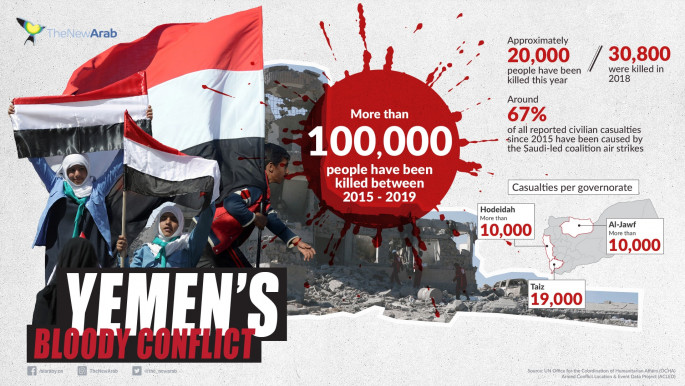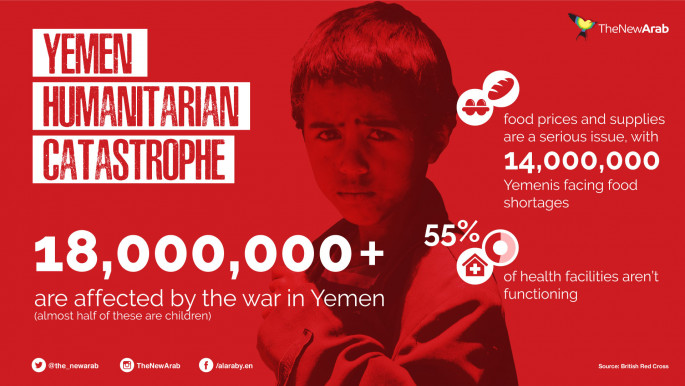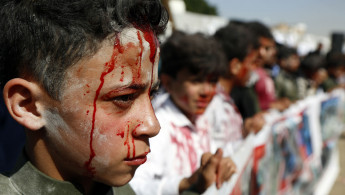Yemen in Focus: High hopes as peace efforts gain momentum in deadly conflict
Speaking at the UN Security Council meeting, UN envoy Martin Griffiths said "there were reportedly almost 80 percent fewer airstrikes nationwide than in the weeks prior".
"In recent weeks there have been entire 48-hour periods without airstrikes at all - the first time since the conflict began. We call this a de-escalation and a reduction in the tempo of the war, and perhaps we hope a move to an overall ceasefire in Yemen," he added, noting that although these are short periods of time, they are nonetheless "striking".
The developments toward peace follow reports of backchannel talks between the Houthi rebels and the Saudi-led coalition, which have fought in a deadly war since 2015, which has claimed the lives of more than 100,000 people, according to ACLED figures.
Khalid bin Salman - the younger brother of Saudi Crown Prince Mohammed bin Salman, who orchestrated he Yemen war some five-years ago - reportedly flew to Omani capital last week where he met Omani Sultan Qaboos bin Said to prepare high-level talks with the Houthi rebels, according to a report published by Foreign Policy.
The prince's diplomatic mission sends a "strong signal" of a shift in Saudi Arabia's war policy, reflecting "a commitment to a final comprehensive peace … and a realisation that there is no military solution to the conflict", said Abu Bakr al-Qirbi, a former Yemeni foreign minister. "I believe Prince KbS hopefully has come with a new vision to put an end to a costly war which has created great regional stability," FP reported.
 |
Khalid bin Salman, who like his brother has also taken a senior Saudi official role despite his relatively young age, was appointed as the kingdom's ambassador to the United States in April 2017. However, the young prince was shifted to deputy defence minister where he manages Saudi Arabia war in Yemen, after his mishandling of the Khashoggi murder saw him plucked from his Washington position.
Last month KbS witnessed his first achievement as deputy defence minister after reconciling the internationally-recognised government of Yemen with southern secessionists after months of deadly battles in Aden in what has been dubbed the Riyadh Agreement.
Prince Khalid said on Twitter that a truce offer made weeks earlier by Yemen's Houthi rebels was "perceived positively" by the kingdom and hoped it would be "implemented effectively".
Shortly after, the rebels released prisoners in a move that was widely seen as a positive step and a welcome development in the five-year stagnant conflict.
But KbS is not the only Saudi royal onboard plans to seek a political solution in Yemen.
On Wednesday, Saudi Arabia's King Salman commented in his annual address to the kingdom's Shura Council that Riyadh is seeking a political settlement to Yemen's conflict.
The 83-year-old monarch also expressed hope that a recent Saudi-brokered agreement would pave the way for broader peace dialogue in the war-torn country.
"We hope that the Riyadh Agreement will open the door for larger understandings among the Yemeni factions," King Salman said in his speech.
The developments also come amid a change of tune for the UAE, which recently suggested the Houthis would in fact have a future role in Yemen, despite Abu Dhabi's deadly five-years of attempting to push out the rebels.
Anwar Gargash, minister of state for foreign affairs in the UAE, urged all sides to maintain momentum for a political solution after a recent peace deal between the government and southern separatists triggered optimism that the move could lead to a wider solution.
"Such an agreement must take account of the legitimate aspirations of all parts of Yemeni society. That includes the Houthis," Gargash said at a political conference in Abu Dhabi.
"Houthi militias have wreaked havoc on the country, but they are a part of Yemeni society and they will have a role in its future."
While no official reasons have surfaced to explain recent conciliatory sentiment in the long-running war, Yemen watchers and analysts have pointed to the rebels' recent successful demonstration of strength in the Gulf, including an attack of Saudi Aramco facilities that halved production levels.
Yemen's Houthis have also increased cross-border missile attacks into the kingdom and have even managed to reach crucial airports in the UAE, according to videos released by the rebels' media arm.
 |
Responding to recent developments in the country, Griffiths confirmed the backdoor talks taking place between conflicting parties.
"These are not small issues," he argued. "Reaching compromises has been no small achievement."
Yemen now needs "the kind of leadership that creates peace", a leader who practices "the art or concession, of inclusion, and who encourages forbearance over entitlement", Griffiths added.
He called for leaders to reach agreements and lay the groundworks for peace building to concrete the path toward peace.
After nearly five years of war, "signs of hope in Yemen…are beginning to produce results", Griffiths said. Yemen's leaders "must now ask themselves what peace should look like".
Saudi Arabia and its military allies intervened in the Yemen war in 2015 in an attempt to restore the authority to the government of President Abedrabbo Mansour Hadi when Houthi rebels took control of the capital Sanaa.
The war has largely resulted in a stalemate between pro-government forces and the Houthis, who still control the country's capital and other major cities.
Yemen's war has killed more than 100,000 people since 2015, according to the Armed Conflict Location & Event Data Project (ACLED). The conflict has left millions at risk of starvation and disease, leading to what the UN has described as the world's worst humanitarian emergency.
UK arms 'doubled'
Meanwhile in other news this week, UK government data showed London has since 2015 doubled the value of arms sales to Saudi Arabia, despite its controversial bombing campaign in neighbouring Yemen.
The UK licensed £5.3 million worth of arms sales to Riyadh from March 2015 until March 2019, amounting to almost a 50 percent increase on the value of arms licenses, which stood at £3.8 million prior to the Yemen conflict.
In reality, the figures are likely to be a great deal higher, according to the Campaign Against Arms Trade (CAAT), which said on Monday that most sales of missiles are licensed via "opaque and secretive" open licence system.
"The bombing has created a terrible humanitarian crisis in Yemen, but the arms companies have treated it as a business opportunity," Andrew Smith, spokesman at CAAT said.
"This war would not be possible without the complicity and support of arms dealing governments like the UK and US, who have pulled out all stops to maximise arms sales irrespective of the human cost," Smith said.
The UK-based campaigning organisation urged London to re-think its relationship with the Saudi kingdom, which has been accused by numerous international rights organisations of human rights violations.
"Regardless of who wins the election next month, there must be a fundamental re-evaluation of the UK's relationship with the brutal Saudi regime," Smith said.
"It is long past time for Westminster to end the arms sales and stop its uncritical support for the dictatorship."
A UK court ruled in June that it was illegal for the government to license weapons exports to Saudi Arabia without first assessing whether there was an "historic pattern of breaches of international humanitarian law" by the Saudi-led coalition that has fought Yemen's Houthi rebels since 2015.
While most EU countries have maintained arms sales to the Saudi Arabia, Germany has halted them over the brutal killing of Saudi journalist Jamal Khashoggi.
Sana Uqba is a journalist at The New Arab.
Follow her on Twitter: @Sanasiino
Yemen In Focus is a new, regular feature from The New Arab.



